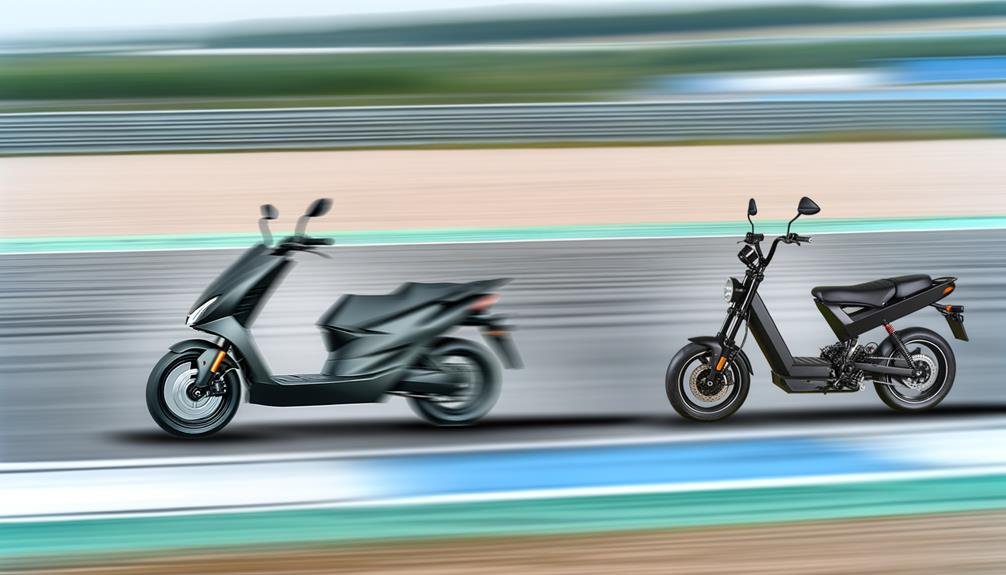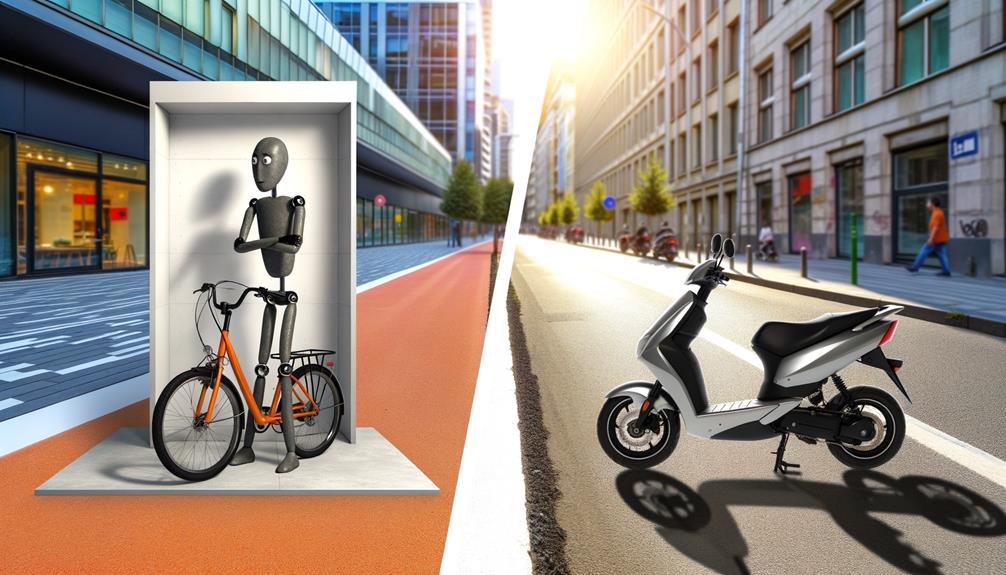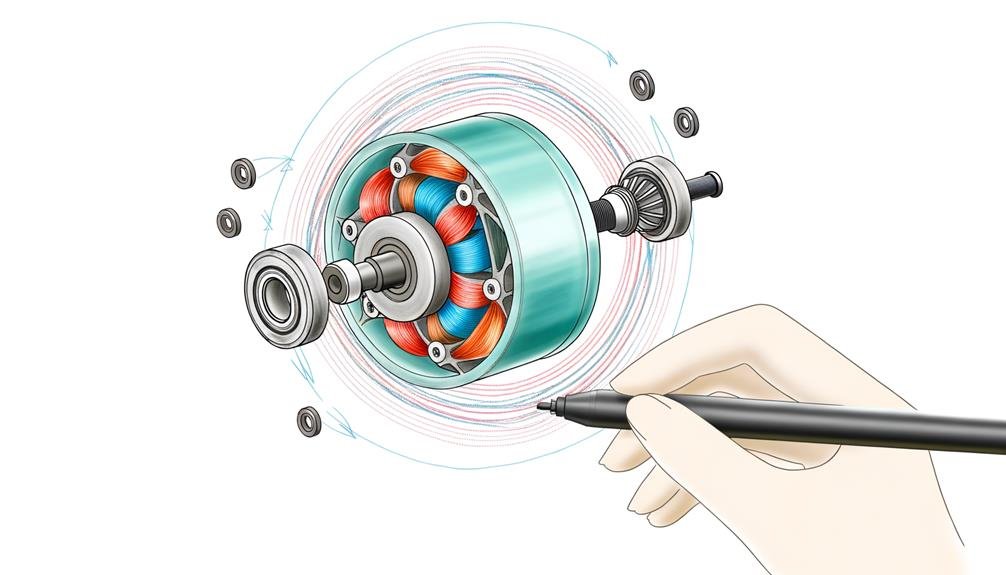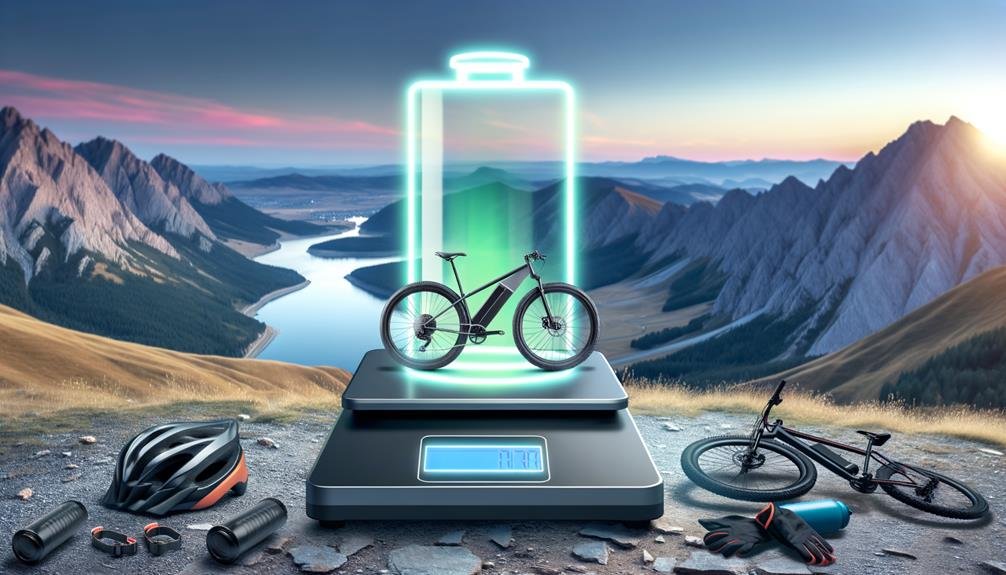Charles Miller is a veteran bike enthusiast with over 12 years of experience dealing with bikes as a mechanic. Despite immense love and expertise for...
It's intriguing to note that global e-bike sales are projected to grow from 3.7 million units in 2019 to about 17 million by 2030. This sparks a heated debate in cycling and motor enthusiast circles alike: Is an e-bike actually a moped?
While at first glance, they might seem similar, the classifications, regulations, and functionalities of e-bikes and mopeds differ quite significantly. Let's peel back the layers of this discussion, inviting you to explore an engaging dialogue on the distinctions between these two modes of transportation.
Key Takeaways
- E-bikes and mopeds are different types of vehicles, with e-bikes being classified as bicycles and mopeds as miniature motorcycles.
- E-bikes offer pedal assist, while mopeds have larger wheels and sturdier frames.
- Licensing requirements, insurance obligations, and legal speed limits vary for e-bikes and mopeds, with e-bikes generally having fewer restrictions.
- The choice between an e-bike and a moped depends on individual needs and preferences, with e-bikes being more accessible and affordable, while mopeds offer higher speeds and storage capacity.
Understanding Ebikes and Mopeds
Diving into the nuances of E-bikes and mopeds, it's crucial to note that E-bikes are essentially bicycles powered by an electric motor, whereas mopeds are miniature motorcycles with a 50cc or less engine displacement, each with distinct operational and legal requirements. We can appreciate the difference between a moped and an electric bike.
E-bikes, equipped with an electric motor, offer pedal assist, augmenting the rider's efforts. They resemble traditional bicycles, their frames fine-tuned for lightness and agility. But, mopeds, with their sturdier frames and larger wheels, are built for durability and higher speeds. The electric power, the heart of an E-bike, is a key component that sets it apart from a moped.
We must note the legal implications of these rides. E-bikes are classified as bicycles, requiring no license, whereas mopeds require licenses or special permits, registration, and insurance due to their engine displacement. While mopeds may offer more in terms of speed and storage, electric bikes offer us a great cardio workout and the freedom of unrestricted movement.
This understanding allows us to feel a sense of belonging in the biking community, appreciating the unique values each ride brings to our journeys.
Legal Considerations for Ebikes
When assessing ebikes, we need to consider vital legal aspects such as licensing requirements, insurance obligations, and speed limits.
Different states or countries may have varying regulations, making it critical for us to understand our legal responsibilities.
Let's now explore these key legal considerations to ensure we're both compliant and safe when riding ebikes.
Ebike Licensing Requirements
To fully grasp the legal considerations for Ebikes, let's delve into the licensing requirements often associated with these electric-powered vehicles.
The ebike licensing requirements aren't universal and laws vary significantly from one jurisdiction to another. Some states require a driver's license to ride an ebike, while others don't impose such legal requirements.
The need for a license often depends on the ebike's speed and power. It's crucial that we understand whether an e-bike falls under the same classification as a moped or motorcycle in the eyes of the law.
As prospective or current ebike owners, we should be aware of and comply with these requirements, to ensure we belong to the community of responsible ebike users.
Ebike Insurance Obligations
Navigating through the legal maze of ebike insurance obligations, it's clear that these obligations vary greatly from one jurisdiction to another, largely dependent on how an e-bike is classified. For instance, in jurisdictions where electric bicycles are treated as bicycles rather than a motorized vehicle, the ebike insurance obligations are typically lesser than those for an average moped.
When you ride a moped, you usually need to meet stricter licensing requirements and require a license, registration, and insurance. However, with e-bikes, the requirements can be minimal. The key is to understand the local regulations and classifications.
E-Bike vs moped, the distinction is pivotal in determining the obligations. It's crucial to remember, not knowing the law isn't an excuse for not following it.
Legal Speed Limits
Just as the classification of an ebike influences its insurance obligations, it similarly impacts the legal speed limits that riders must adhere to.
Depending on the class, ebikes can reach a maximum speed of 20-28 mph. The top speeds vary by jurisdiction and power output, making it essential for riders to stay informed about their local laws.
Certain speeds are legally permitted, ensuring that e-bikes offer a safe and regulated alternative to gas engines, which are typically heavier than e-bikes. Compliance with these speed limits is crucial to avoid fines or penalties.
We encourage all riders to understand their local legal speed limits and adhere to them, fostering a sense of belonging within the responsible and law-abiding ebike community.
Legal Considerations for Mopeds
Before diving into the specifics, it's important we understand that mopeds, unlike e-bikes, typically require a driver's license or special permit to operate in most jurisdictions. This is one of the key legal considerations for mopeds.
Mopeds often need to be registered and insured as well, adding another layer of regulation to their use. While asking 'is an ebike a moped?' might seem like a simple question, the legal realities are complex and varied.
The specifics of what constitutes a moped can also vary. In many places, a vehicle is considered a moped if it has less than two horsepower, and the moped weighs less than 100 pounds. However, these definitions can differ, leading to confusion about what's and isn't a moped.
In contrast, e-bikes are generally allowed to ride without the same legal restrictions. They're typically classified as bicycles, not requiring the same licensing or insurance. Yet, their use is still regulated, particularly regarding where they can be ridden.
Comparing Speed and Performance

While legal considerations distinctively separate mopeds from e-bikes, comparing their speed and performance further highlights the differences and similarities between these two modes of transportation. Mopeds can go faster, reaching speeds of 63 miles per hour (mph), while e-bikes come with various power modes, offering riders the ability to tailor their ride based on desired speed and exertion level. The top speed for most e-bikes is lower, usually capped at around 28 mph.
However, speed isn't the only important factor when measuring performance. The pros and cons of each type also come into play. One of the pros of e-bikes is that they don't require a license or permit, unlike mopeds. This makes them more accessible to a wider range of people. On the other hand, mopeds often have larger storage compartments or racks, providing more convenience for longer trips or bigger hauls.
Ultimately, the choice between an e-bike and a moped will depend on individual needs and preferences. Factors such as speed, storage capacity, and legal requirements are all important considerations. So, whether you're looking for a leisurely ride or a quicker commute, both options provide their own unique benefits.
Pros and Cons: Ebike Vs Moped
Diving into the pros and cons of e-bikes versus mopeds, it's important to consider aspects such as licensing requirements, maneuverability, speed, and routine inspections.
E-bikes, including electric kick scooters, are a good choice as they don't need licenses, insurance, or registration. Mopeds, on the other hand, typically require a driver's license or special permit.
When you pedal an e-bike, you're harnessing pedal power to provide assistance, making it feel like a regular bike. They're lighter and more maneuverable, a big advantage in urban environments. Mopeds, while heavier, can achieve higher speeds. What you need to know is that e-bikes generally don't require regular inspections, unlike mopeds which often do.
The pros and cons: ebike vs moped debate extends to the matter of transportation. E-bikes are an affordable and convenient alternative to cars, easily parked almost anywhere. Mopeds are suited for longer distances and hills, making them a popular choice for commuting or short trips.
In essence, your choice between an e-bike and moped depends largely on your personal needs and environmental considerations.
Making Your Decision: Ebike or Moped

After weighing the pros and cons of e-bikes versus mopeds, it's crucial to determine which option best suits your specific needs and circumstances. In making your decision: ebike or moped, consider the following:
- E-bikes are less expensive, and they help riders with limited physical capabilities still use a bike for commuting around town. They offer a wide range of power levels to assist you based on your energy or fitness level.
- Mopeds, though more costly, provide higher speeds and may be suitable for longer distances or quicker commutes.
- E-bikes are generally easier to handle and lighter, making them a good choice for those new to motor-assisted travel.
- Mopeds require registration and insurance in most places, adding to their overall cost and responsibilities.
Before you make a decision, make sure you think about where you'll be using your ride most frequently, your budget, your physical capabilities, and the local regulations. Both e-bikes and mopeds have their strengths and can cater to a wide range of needs.
Whichever you choose, you'll be joining a community of riders who value efficient, environmentally friendly transportation.
Frequently Asked Questions
Is Electric Bike a Moped?
No, an ebike isn't a moped. They've different speed limitations, battery capacities, and legal requirements. Ebikes have advantages like lower maintenance, and both have safety features. Their environmental impacts also differ.
What Is the Difference Between E Scooter and E Bike?
We're comparing e-bikes and e-scooters. Scooter designs are compact, with bikes offering different mechanics. Power source is electric for both, but speed and riding experience differ. Costs, safety measures, and usage scenarios vary too.
What Classifies an Electric Moped?
We're unraveling the knotted question of what classifies an electric moped. Moped features, including speed, battery life, charging options, and maintenance, along with safety measures and green transportation aspects, are in the mix.
What's the Difference Between Bike and Moped?
We're comparing bikes and mopeds, considering factors like history, speed, fuel efficiency, maintenance costs, licensing requirements, and environmental impact. They've both evolved for safety, but differ greatly in speed, cost, and impact on the environment.
Conclusion
So, there you have it! Ebikes aren't mopeds, and we'd be laughing out of our bicycle helmets if we thought otherwise.
Mopeds are like the ebike's rowdy, gas-guzzling cousins with a need for speed. Meanwhile, ebikes are the eco-friendly, fitness-loving siblings who don't mind a little pedal power.
So, whether you're after a breezy ride or a sweat-breaking journey, the choice between an ebike and a moped is yours to make.

Charles Miller is a veteran bike enthusiast with over 12 years of experience dealing with bikes as a mechanic. Despite immense love and expertise for his Tacoma, he rides his Trek Ebike more. Anytime you meet him, you’ll either hear him talking about Bikes, or writing about all things bikes and cars on this blog.
More Posts


